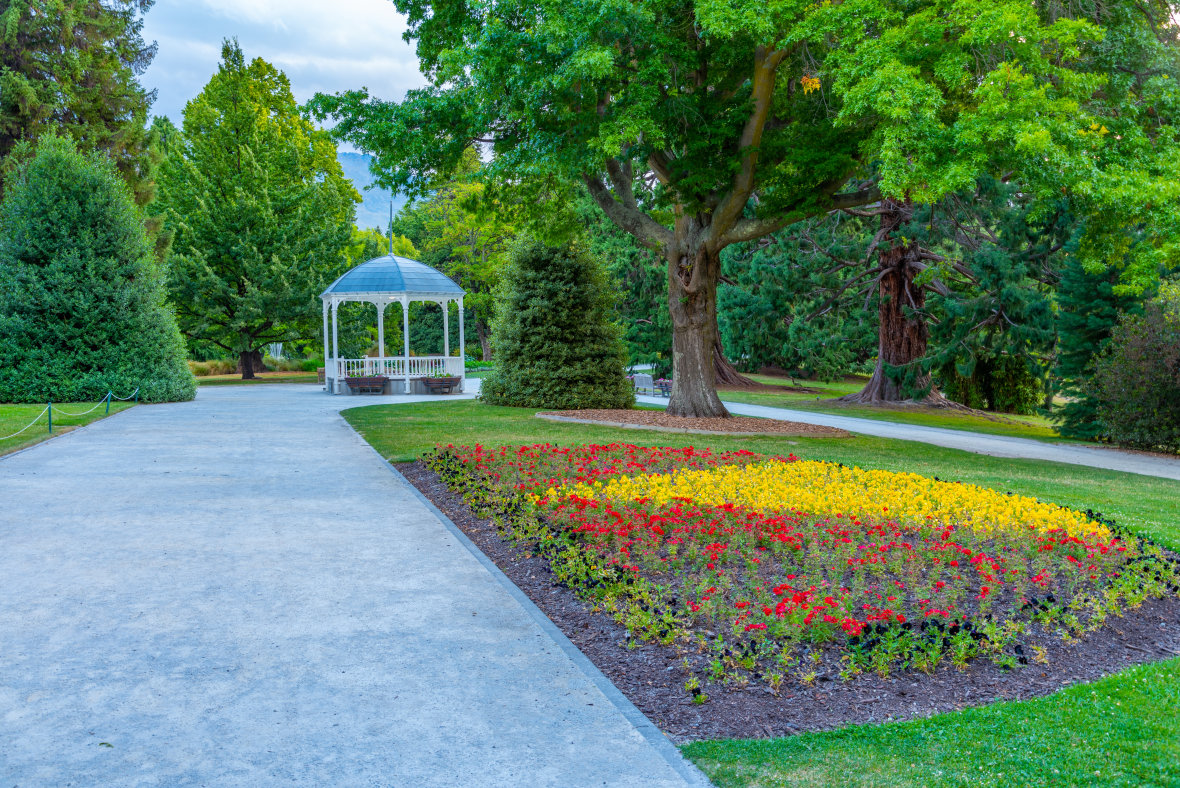Why do people go to Queenstown Gardens?
People visit Queenstown Botanic Gardens to enjoy its peaceful setting and close proximity to town. It’s a place to walk, rest, or spend time outside, whether you’re travelling solo, as a couple, or with children.
Key reasons people go include:
-
Walking trails around the lake’s edge with views of Lake Wakatipu and the Remarkables
-
The Queenstown Gardens disc golf course – a popular 18-basket layout weaving through mature trees
-
Photography – especially during spring blossom season and autumn foliage
-
Floral displays and heritage plantings, including rhododendrons, roses, and established exotic and native trees
-
Open lawns for picnics or quiet time away from town
-
A rotunda, memorials, and historic landmarks, including Queenstown’s first European cemetery
Te Kararo Queenstown Gardens is also a place of cultural significance. The name refers to the original kāika (settlement) that stood here, which was once home to Ngāi Tahu whānau living along the lakefront.
How long should I spend at Queenstown Gardens?
Most visitors spend 1 to 2 hours at enjoying the various Queenstown Gardens activities. This allows enough time to complete a loop walk around the peninsula, take photographs, and enjoy the lake views.
If you plan to play disc golf, stop for a picnic, or explore the gardens in more detail, allow 2 to 3 hours. The site is open year-round and doesn’t require a ticket or formal entry, so it’s easy to stop in for a short visit or spend a relaxed afternoon.
Queenstown Gardens history
Queenstown Gardens were first established in 1867 when the area was set aside as public reserve. The gardens were formally planted the following year with a mix of native and exotic species, many of which still stand today as mature specimens. Early settlers developed the gardens to create a formal green space in what was then a growing gold rush town.
Over time, features such as the rotunda, Bowen memorial, and disc golf course were added, reflecting changes in how the gardens were used. The site is also known by its original name, Te Kararo, which acknowledges its earlier role as a lakeside kāika (settlement) for Ngāi Tahu whānau. Today, the Gardens reflect both cultural heritage and ongoing community use.
How to get to Queenstown Gardens
Queenstown Gardens are located just a short walk from the town centre. From the lakefront, follow the paved path that runs alongside Queenstown Bay. You’ll enter the Gardens at the rotunda near the Queenstown ice arena.
From SH6, follow signs into Queenstown and turn onto Park Street. There is limited parking available near the Gardens, but walking is often more convenient, especially during busy months.
Queenstown Gardens opening hours
Queenstown Gardens are open year-round, 24 hours a day. Entry is free, and there are no gates or admission requirements.

Best time to visit Queenstown Gardens
Best time of year: Queenstown Gardens can be visited at any time of year, but each season offers something different:
-
Spring (Sept–Nov): Flowerbeds come into bloom, with cherry blossoms and fresh growth.
-
Summer (Dec–Feb): Warm, long days make it ideal for picnics, disc golf, and lakeside walks.
-
Autumn (Mar–May): The trees are known for their gold and orange tones – a highlight for photographers.
-
Winter (Jun–Aug): Crisp, quiet days with snowy mountain backdrops. A peaceful time to explore.
Best time of day:
-
Morning: Softer light, fewer people, and good conditions for photography.
-
Late afternoon: Golden light over the lake and surrounding peaks, especially toward sunset.
-
The disc golf course is busiest late morning and early afternoon, so early or later visits offer more space to play or walk.
Weather at Queenstown Gardens
Queenstown experiences four distinct seasons, with temperatures ranging widely depending on the time of year:
-
Summer (Dec–Feb): 20–30 °C
-
Autumn (Mar–May): 8–22 °C
-
Winter (Jun–Aug): -2 to 8 °C, often with frost and occasional snow
-
Spring (Sept–Nov): 8–22 °C, with a mix of cold mornings and warm days
Weather can change quickly in this alpine region, so pack layers, especially if visiting in the shoulder seasons or winter.
What to do for free in Queenstown
Queenstown offers several free or low-cost activities, making it easy to experience the region without spending much:
-
Walk through Queenstown Botanic Gardens, especially during spring and autumn
-
Hike nearby tracks like the Queenstown Hill Time Walk or Ben Lomond Track
-
Stroll the Queenstown lakefront, passing the wharf, gardens, and beaches
-
Enjoy local street performers or browse weekend markets near the waterfront
-
Pack a picnic to enjoy at the Gardens or along the beach at Queenstown Bay
The Gardens remain one of the best-value spots in Queenstown – ideal for those travelling by campervan and looking to stretch their legs without booking an activity.
Queenstown Gardens parking
Parking directly at the Queenstown Gardens is limited, especially during peak times. Overnight parking is not permitted. If you’re staying locally, many campgrounds and holiday parks are within walking or cycling distance.
Road trips that pass through



